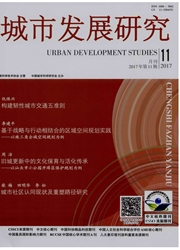

 中文摘要:
中文摘要:
开发区业已成为中国快速工业化和城市化进程的重要空间载体。在开发区建设中,不仅发生了产业结构和人口结构的变化,也重构了地方的地理景观和社交网络,这将改变居民原有的地方感,并可能使开发区成为缺乏凝聚力和社会矛盾突出的空间。论文主要结合对上海闵行经济技术开发区周边三个社区居民的调研访谈,初步探讨开发区建设中的居民地方感变动机理。研究显示,虽然产业结构升级有助于提高居民的生活质量,但普通劳动力的集聚却可能削弱居民对地方的认同;而地理景观的变化却由于改善了居民的生活条件而增强了地方感;不过社交网络的重构却面临本地人和外地人之间情感分异的困难,居民对开发区和小区的地方感都处于较低水平。
 英文摘要:
英文摘要:
Development zones have become important carrier of China's rapid industrialization and urbanization. In development zones, not only the industrial structure and population structure might change rapidly, but also the local geographical landscape and residents' social network be reconstructed, which could weaken the original sense of place of local residents and make the development zones space lack of cohesion and full of social contradictions. This study mainly surveyed residents in three communities around the Minhang Development Zone to explore the change mechanism of residents' sense of place under the influence of development zones. It shows, the construction of development zones may upgrade the local industrial structure and promote life quality, but the gathering of common labors will perhaps weaken the residents' sense of place. However, the disappearance of familiar landscapes may promote the residents' sense of place because of the more convenient living conditions. The reconstruction of social network may face the difficulties caused by emotional differentiation between the locals and immigrants, which makes the residents' sense of place at a lower level.
 同期刊论文项目
同期刊论文项目
 同项目期刊论文
同项目期刊论文
 期刊信息
期刊信息
